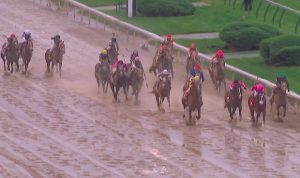NBC Sports Deploys Networked Audio Team for the Kentucky Derby
Complex coverage smoothly handles transformation of entertainment show into news event
Story Highlights
The one sound that the broadcast audio might not have captured at Saturday’s Kentucky Derby was the one you couldn’t hear: the bated breath with which a crowd of more than 150,000 racegoers at Churchill Downs awaited the ruling of three track stewards as to which horse and rider actually won the sport’s single biggest annual race.
Other than that, the audio coverage deployed by NBC Sports over the three days leading up to and including the race was substantial, with 23 audio staffers working from NEP ND1’s main production suite, SS25’s two trailers, and wireless provider BSI’s onsite production facility. These were all connected via MADI, using parallel Dante and Calrec Hydra networks for audio from the various sets and locations around the track. A1s Wendel Stevens and Lee Pfannerstill mixed the NBC Sports and SportsNet shows, respectively, and submixer Ryan Outcalt handled audio effects for both networks.
The audio coverage was complex but rewarding. Complications included needing to keep a constantly rotating chain of more than a dozen onsite talent and special guests heading to their next stops on schedule and with the right equipment. According to Outcalt, a small entourage accompanying each talent helped facilitate that and was connected to production via a wireless RTS intercom system with OMNI implementation for beltpacks, as well as high-power radios, also supplied by BSI, to provide the necessary range.
“They had to be able to be connected to any set at any time, so it was a big matrixing challenge,” he says. “Each A2 with each group would call in with any equipment requirements, such as switching to a lav mic and making sure that each talent is connected to the correct IFB. There were as many as five crosspoints for all of this, so we needed a dedicated person working the matrix like a traffic cop.”
Close-Up Sound
The effort was rewarding because this was a great-sounding race, in part because of — rather than in spite of — the muddy track left by several days of steady rain.
“We were very lucky that we had three jockeys agree to wear wireless lavs during the race, so we had microphones right in the middle of the pack at all times,” Outcalt explains. “The lavs [were] on the crook of the jockeys’ arms, so the microphones were pointing out towards the horse next to them. Before the race, boards [are dragged] over the track to pack down the mud so that any rain rolls off of the track. That makes it a fresh, hard surface, which is great for sound and also keeps dirt from flying up into the mics like it can on a dry track, which can sometimes sound like static. That helped bring the sounds of the horse out, especially when you have 150,000 people screaming around them.”
He adds that the quintessential sound of any horse race is found at the starting gate, where lavs placed on it capture the sound of the horses and the outriders guiding them into the clanking gate slots, the jockeys talking to their mounts just ahead the bell, which shrilly launches them down the track into history.
The Outcome
And history was made on Saturday, though not necessarily the way anyone expected or necessarily wanted. Right after crossing the finish line, putative winner Maximum Security’s jockey Luis Saez leaned to his left in conversation with the horse’s red-coated outrider, joyously reliving the last two minutes for viewers, his words picked up by the outrider’s shoulder-mounted microphone (provided, like his helmet cam, by BSI) and then by the stick mic wielded by NBC Sports reporter Donna Brothers on horseback. The shot then shifted to trackside interviews with Maximum Security’s owners and trainer.
Then came the video-replay reviews. Twenty-two minutes later, Maximum Security’s win was declared null, and the win was given to Country House. The television production transformed in short order from a tightly laid-out entertainment show to a sports production to a breaking-news special. Throughout, NBC Sports production staffers never blinked.
“We were all wondering what had happened, how it was going to turn out, wondering if we were going to see history,” Outcalt recalls. “But we presented it as it went down, interviewing as it happened. We made sure we caught the reactions when the judgment was announced.”
Home viewers heard the raucous catcalls that began emanating from the grandstand, as some attendees voiced disapproval of the three officials’ unanimous call. But there was cheering as well, by Country House partisans. The drama drove the narrative from that point, says Outcalt, but professionalism drove the show.
“We were very proud of how we handled all of that, and the tremendous effort everyone made to successfully put on such a complicated show,” he says. “Three days and then nine hours on the air on race day alone. It was a huge show, and it turned out great.”

